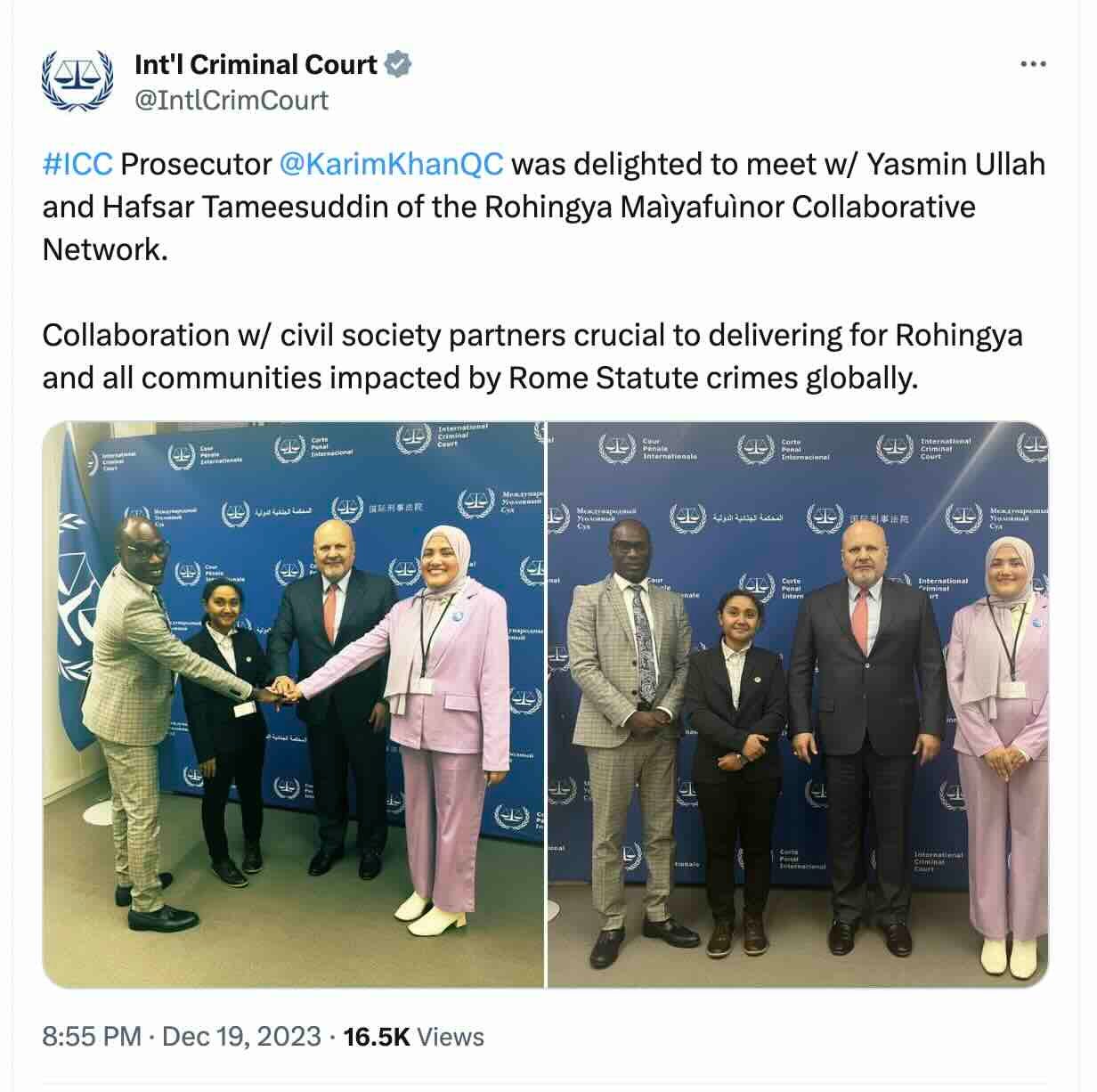Karim Khan's ICC in the Spotlight Over Rohingya
The prosecutor has achieved celebrity status amongst Rohingya but what about the actual investigation?
In the international legal arena, International Criminal Court (ICC) Prosecutor Karim Khan has been making headlines, but not all for reasons of judicial triumph. Recent activities have seen him engaging in public relations efforts with the Rohingya, appearing in photographs and holding token meetings with diaspora Rohingya organisations. However, beneath the surface of this public engagement, there is a growing concern that marketing and image management are overshadowing actual progress in addressing the complex legal issues at hand. This is particularly evident in the criticisms levelled in November 2023 by legal representatives of the victims, who argue for a more substantive approach to justice.
Recently, I covered Khan's visit to Bangladesh, observing his overly cordial approach towards the government. I argued that his approach with Bangladeshi officials could compromise the impartiality essential for a thorough and unbiased investigation into all potential perpetrators, including not just the Myanmar military but also other parties facilitating crimes against the Rohingya.
This concern is exemplified by the events surrounding the destruction of No Man's Land in January 2023, a subject I plan to look into in a forthcoming article. Echoing concerns raised in a 2019 submission by one set of Legal Representatives for Victims (LRVs), there's a necessity for an impartial investigation that encompasses all potential perpetrators, including officials of Bangladesh. Khan’s approach, such as in sensitive cases like No Man's Land where Bangladesh is implicated, risks aligning with narratives that may not fully contribute to comprehensive justice.
Since November, Khan has found himself under increasing pressure. Not only is the situation with the Rohingya a concern, but the ongoing conflict in Palestine has brought severe scrutiny to his doorstep. He's accused of offering limited, rhetoric-heavy responses (initially at least), showing a lack of action in the investigation initiated in 2021, and failing to act despite substantial evidence from Palestinian NGOs and the state of Palestine. His approach was criticised for focusing on urging parties to comply with international humanitarian law rather than readiness to proceed with legal actions. Perennial accusations of double standards, particularly in the resourcing and prioritisation of investigations, have raised questions about his impartiality.
The Victims Participation and Reparations Section, for instance, aimed to conduct a mission to Bangladesh in 2023. However, it found itself unable to do so (see footnote 10), hampered by limited financial resources and competing priorities.
As Karim Khan navigates the complexities of the Rohingya crisis, he confronts significant legal challenges raised by the LRVs. To appreciate the gravity of these challenges, it's essential to first understand the dire context of the Rohingya camps. Conditions there have significantly deteriorated, marked by increased violence, restricted access to employment and education, and a pervasive fear of international neglect.
Against this backdrop, a particular set of LRVs have voiced strong criticisms of the ICC's procedures, demanding more transparent and robust protocols to ensure fair and effective representation. However, their calls have hit a wall with the Prosecution's response, which insists that the existing legal framework and practices are sufficient, effectively dismissing the need for the proposed changes.
This dissatisfaction is well captured in the “ICC-01/19-52-Anx1-Red” submission. The document serves as a plea for improved handling of confidential information and more respectful interactions with witnesses and represented victims. It particularly emphasises the need for special caution in protecting the privacy and dignity of victims in sexual or gender-based crimes, underlining the importance of not revealing sensitive details without necessary consent. It outlines the challenges faced in obtaining necessary materials from the Office of the Prosecutor (OTP) and highlights the lack of clear guidelines for legal representatives. The submission advocates for a comprehensive protocol to safeguard the confidentiality and dignity of victims throughout the investigative process.
Interestingly, the Office of Public Counsel for the Defence (OPCD) expressed a willingness to support the LRV proposals. Their submission "ICC-01/19-56" outlines a nuanced understanding of the need to balance the integrity of investigations with the rights of both victims and potential defendants. They advocate for the adoption of early protocols and express a readiness to contribute to refining the existing procedures.
Furthermore, the involvement of the Office of Public Counsel for Victims (OPCV), as indicated in their submission “ICC-01/19-55-Corr,” suggests potential support for the LRVs' stance. This document outlines the OPCV's desire to contribute to the discussion over the 'Request for the Adoption of a Protocol and for Access to the Confidential Record' in the Bangladesh/Myanmar situation.
However, the prosecution's response, detailed in "ICC-01/19-57," was less than sympathetic. They not only rejected the submission outright but also argued that the challenges and requests presented by the LRVs were unfounded and even detrimental to the investigation and fair trial process. This summary dismissal has raised eyebrows, notably because it seems the OPCD, focused on defending the accused, appears more attuned to the victims' rights than the prosecution itself!
In sum, the ICC's recent actions under Khan's stewardship and the evolving dynamics of international criminal justice have stirred a complex mix of confusion, disappointment, and critical reflection. These developments raise questions about the ICC's approach to balancing the rights and needs of victims, defendants, and the pursuit of justice in complex international cases, highlighting the need for a comprehensive and unbiased pursuit of justice.
social media/cover image: ictyphotos

